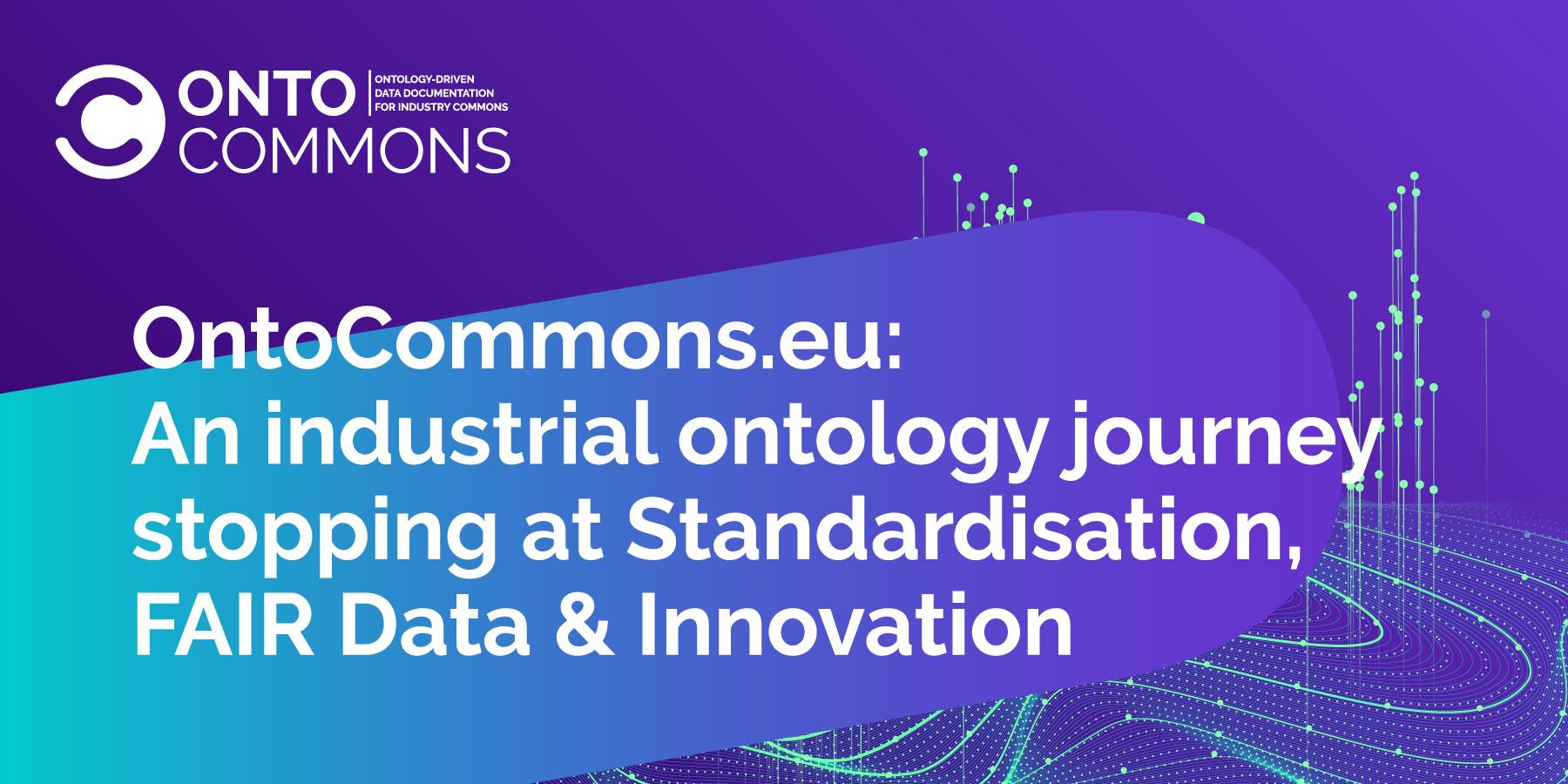
- 18 March 2021
On 23 February 2021, the first OntoCommons webinar OntoCommons.eu: An industrial ontology journey stopping at Standardisation, FAIR Data & Innovation took place online.
The webinar gave the participants the opportunity to learn more about the Ontology Commons EcoSystem (OCES), the roles played by the Top Reference Ontologies, Industrial Domains, FAIR Ontologies and Standardisation in the ontology ecosystem and the OntoCommons plans to grow the community through engagement with key Focus Areas.
The webinar was well-received with a total of 40 participants, mainly coming from Europe, with a participation rate of 92%.
Highlights
The webinar was moderated by Cristina Mancarella, Research Analyst at Trust-IT Services, who introduced and moderated the Q&A session.
The speakers of the webinar are all members of the OntoCommons consortium:
- The first speaker was Nadja Adamovic, Senior Scientist at TU Wien and OntoCommons Project Coordinator. Nadja provided an overview of the OntoCommons project structure and its consortium. Moreover, Nadja explained how overcoming interoperability bottlenecks and facilitating data sharing is the core of the project's vision as it enables the OntoCommons objectives and impacts. Nadja's presentation was concluded showing the benefits of building the Ontology Commons EcoSystem, which is composed by different applications, domains, middle and top reference levels and tools, useful for standardisation and data documentation purposes.
- Hedi Karray, Professor at ENIT and OntoCommons Technical Coordinator and Silvana Muscella, CEO and Founder at Trust-IT Services continued the webinar explaining how OntoCommons can build on existing solutions in a Global setting. In particular, Hedi described what are the main reasons for ontology failure and how OntoCommons is going to overcome it by building the OntoCommons Top Ontology Reference (TRO). The TRO is composed by a Meta Ontology (MO) and a series of selected Top Level Ontologies (TLOs), and enables a common foundation for data interoperability between Top Level Ontologies (TLOs) and lower level ontologies.
- Silvana stressed the important role played by OntoCommons in enabling interoperability through sharing terminology and proposing ontologies. Indeed, the project can serve as a basis for developing a landscape analysis to assess all ICT Standardisation efforts in ontologies. Moreover, OntoCommons is going to address recommendations, gaps and priorities around the ontology domain from a standardisation perspective and list them in the OntoCommons Roadmap. In order to pursue its objectives, OntoCommons is going to cooperate with existing relevant initiatives, like StandICT.eu. StandICT has recently launched the EUOS, the European Observatory for ICT Standardisation that consists of different Technical Working Groups (TWG) which deliver a gap and landscape analysis in specific fields. OntoCommons is going to take part to the TWG linked to the ontologies.
- The fourth speaker was Gerhard Goldbeck, Founder and CEO at Goldbeck Consulting Ltd. Gerhard explained who are the relevant industrial stakeholders (Domain experts, Ontologists, Implementers, Industrial Stakeholders and Business Ecosystem Stakeholders) for OntoCommons. Each stakeholder has different expertise and the OntoCommons Focus Area has been introduced to let the experts be engaged and, as a consequence, contribute to the project's objectives. Gerhard introduced the project thematic demonstrators too. The demonstrators involve leading industrial organisations and research institutions to build use cases developed on different domains. Gerhard concluded its presentation stressing the importance of creating synergies and cooperating with relevant actors in the industrial world.
- Yann Le Franc, CEO & Scientific director of e-Science Data Factory, explained what the FAIR principles are: they are guiding principles for data management that make data Findable, Accessible, Interoperable and Reusable. OntoCommons project is going to follow and leverage on existing guidelines and FAIR semantic recommendations to build its ecosystem. Moreover, Yann stressed the importance of creating fair ontologies as they strongly contribute to interoperability. Indeed, data and metadata used to standardise and document data need to follow fair rules to develop high-standard systems.
- The last speaker was Michela Magas, Chair of the Industry Commons Foundation and OntoCommons Innovation Manager. Michela started her speech stating that the innovation potential brought by OntoCommons is huge and involve different levels of manufacturing processes optimisation. The Industry Commons supports innovation in the OntoCommons project as it fosters mechanisms and standards for shareable and reusable knowledge across industrial domains. In order to bring innovation, OntoCommons is going to overcome existing bottlenecks linked to data-driven innovation, such as lack of interoperability, lack of data, prioprietary IP and unpredictability of the use cases. Overcoming the bottlenecks will be achieved through the creation of the OntoCommons EcoSystem, which represents the foundation and enabling mechanism for industry commons as it involve data re-use, data valorisation, collaborative innovation, and more agile supply chain interactions. In addition, OntoCommons is implementating strategies to guarantee its long-term sustainability. It is ensured by promoting results in technology beyond the core community, aligning with further interoperability developments across industry sectors, supporting the evolution of standards and making sure they are used as core components of the wider industrial ecosystem.
If you missed the OntoCommons webinar, click here to watch the recorded webinar and download the speakers' slides.
